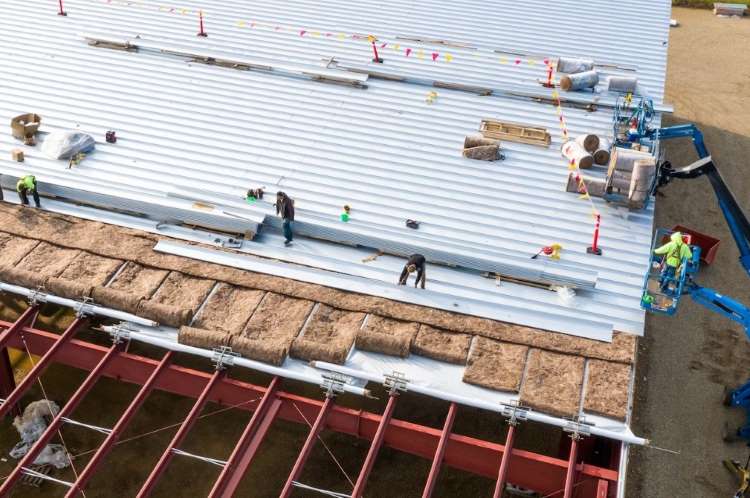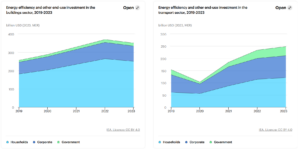
Energy efficiency is one of the most impactful, yet often overlooked strategies of climate action. Improving energy efficiency can significantly reduce emissions, enhance energy security, and create a more sustainable global economy. However, progress is slower than required, with the global rate of improvement falling behind targets set in recent climate accords such as COP28. To meet climate goals, the world must double its energy efficiency efforts by 2030, in terms of both individual and collective action.
Energy efficiency is about achieving more with less — using the same or less energy to power buildings, transport systems, and industrial processes while yielding the same or even better results. Optimal energy use can reduce greenhouse gas emissions, lower energy bills, and boost economic resilience. The benefits are multidimensional, from creating jobs and improving public health to strengthening national energy security. According to the IEA’s Energy Efficiency 2024 report, governments representing 70% of global energy demand have implemented updated efficiency policies in 2024, yet the current rate of improvement remains at around 1%, well below the targeted 4% by 2030.
Doubling down on efficiency is essential for meeting climate targets and sustaining economic growth. The potential impacts are profound: studies show that improved efficiency can cut energy bills by 20-25%, yielding trillions of dollars in savings globally by 2030. But achieving these benefits will require accelerated policy implementation, public and private sector collaboration, and an increase in energy-efficient technologies across industries.
READ I Air pollution: Strict penalties and timely action for cleaner air
Economic and environmental benefits
Efficiency measures present an opportunity to reduce energy expenses while supporting climate commitments. As highlighted in recent reports, businesses that conduct energy audits — systematic assessments of energy use to identify waste — can see immediate reductions in operational costs. An energy audit allows companies to identify quick wins in efficiency, from simple upgrades like LED lighting to advanced systems that optimise heating, ventilation, and cooling.
The financial incentives for efficiency are clear: energy costs can comprise up to 20% of a company’s expenses, and even modest reductions offer substantial savings. Furthermore, every kilowatt-hour saved reduces greenhouse gas emissions, helping businesses meet sustainability goals and enhance their market reputation. Amid rising energy costs, these savings also provide a crucial buffer against economic volatility.
Energy efficiency: Accelerating the path to Net Zero
Achieving net-zero emissions is a daunting challenge, but energy efficiency offers a shortcut. By lowering the overall energy demand, we reduce the amount of renewable capacity needed to power the global economy, accelerating the transition to a clean energy system. Studies suggest that maximising efficiency could enable a phase-out of fossil fuels well before 2040, shaving years off the path to a zero-carbon future.

Transitioning to renewable energy alone will not be sufficient if we fail to reduce demand. Each kilowatt-hour saved translates directly into lower emissions, which is critical as renewable energy sources scale up. For example, in India, where building floor area is expected to double by 2040, efficient building design could reduce projected energy demand by 25% and emissions-intensive materials by 45%. Efficient energy use thus extends the benefits of clean energy by reducing the infrastructure and resources needed to support sustainable growth.
Energy security through efficiency
Efficiency is a powerful tool for energy security, especially in regions heavily dependent on imported fossil fuels. As energy prices fluctuate due to geopolitical tensions and market dynamics, countries investing in efficiency are better positioned to safeguard their economies. For instance, Asia, which accounts for 80% of global coal consumption, can significantly reduce its reliance on coal through energy efficiency and grid modernisation. By optimising their grids, countries can stabilise power supply while reducing emissions, a strategy particularly vital as energy demand grows across the continent.
The World Energy Outlook 2024 report emphasises that efficiency can lower demand growth, reducing the strain on energy infrastructure and avoiding costly investments in new capacity. As renewables take a larger share of the energy mix, efficient grids are crucial for ensuring stability. Investment in advanced grid infrastructure, including technologies like high-voltage direct current for efficient long-distance transmission, will be essential to handle the complexities of a renewables-powered future.
Making energy efficiency accessible to all
Efficiency improvements also help reduce the energy cost burden on low-income households, which spend a disproportionate share of their income on energy. In the US, the poorest 10% of households spend four times more on energy, relative to income, than the richest 10%. Efficiency upgrades, such as better insulation and modern HVAC systems, can reduce these costs, easing economic pressures on vulnerable communities.
Energy efficiency also creates job opportunities, particularly in sectors like construction, manufacturing, and distribution. Efficiency-related jobs are local and resistant to automation or offshoring, benefiting communities and contributing to economic stability. Furthermore, efficient public transit systems can expand access to jobs for those unable to afford private vehicles, as seen in Medellín, Colombia, where a new cable car system connected underserved areas to economic centres, creating broader social benefits beyond energy savings.
Efficiency does more than cut emissions — it protects ecosystems by reducing the demand for resource-intensive energy production. Efficient urban design can reduce car usage and pollution, while compact buildings require less energy and water. By preventing urban sprawl, we preserve land for agriculture and ecosystems, protecting biodiversity and supporting food security. Efficiency thus emerges as an essential component of planetary stewardship, safeguarding natural resources as we transition to a sustainable energy system.
The way ahead
Despite the clear benefits, energy efficiency lags behind other climate strategies in terms of funding and public attention. Governments and businesses must prioritise efficiency to meet climate goals and capture the economic benefits. Policy measures, such as tax incentives and rebates for energy-efficient products, can make efficiency accessible to more consumers. Businesses should also lead by example, integrating efficiency into their operations and collaborating to overcome barriers in technology adoption and financing.
IEA’s new Energy Efficiency Progress Tracker shows that progress is not happening at the necessary pace. Increased investment, public awareness, and policy support are critical to scaling up efficiency measures. Governments, corporations, and consumers all play a role in creating a world where energy efficiency is the norm, not the exception.
Energy efficiency is a powerful, cost-effective solution to reduce emissions, bolster energy security, and improve the quality of life for people around the world. It accelerates the journey to a carbon-free future, making the transition more affordable, equitable, and beneficial for the environment. As the world faces escalating climate challenges, efficiency is not merely a policy option — it is a necessity.
